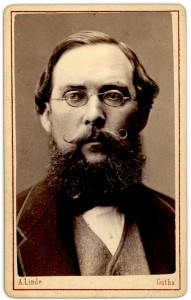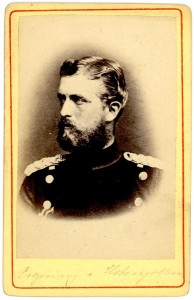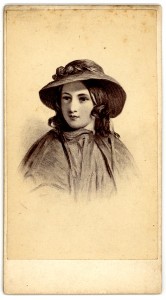Guest blog from Mae Humiston, one of our Tufts student employees. Below she reflects on her work on the Ryder collection which is now partially available through the Tufts Digital Library.
Two months ago I was presented with a box of cartes-de-visite of 19th century-era philosophers, writers, and generals from both the American Civil War and the Franco-Prussian War collected by Reverend William Ryder. I affectionately called them the Civil War trading cards. Cool, I thought, I get to spend some quality time with men sporting fantastic facial hair and serious/mysterious expressions. I also thought I’d be done very quickly- I was just writing up the names scrawled on the cards, right? But it wasn’t so! I had embarked on a journey of puzzles and frustrations and magnificent moments of comprehension. You see, in the process of trying to identify the individuals depicted, I had to decipher names written in infuriatingly faded cursive. Sometimes they were completely illegible or missing altogether. And the hunt began!
With help from other people in the office (“Hey Mae! I need a break from my work. You got a mystery man for me?”) and a huge range of internet sites in English, German and French, we set about identifying the solemn faces watching us in their highly decorated uniforms. Sometimes our efforts to read a name would result in hilarious and highly unlikely names. We gave one man, whose name evaded us for at least three weeks, the moniker “Hokengubleon” (say it out loud)- because that’s what the cursive writing looked like- until Susanne finally identified him as Leopold von Hohenzollern, a much more sensible name.
Every once in a while a cry of victory would ring out from one of the cubicles and everyone would rush over to learn the true identity of the pictured man. We’d all get a small lesson on his role in the Franco-Prussian or American Civil War (or in popular culture: Ambrose Everett Burnside was the namesake of sideburns. Makes sense.). I took particular interest in the drama among Union generals: Don Carlos Buell declined to serve under William Sherman because he outranked him, a move that did not make Ulysses S. Grant happy. But I digress. The point is, by the end, I knew many of the histories of the men and even how to distinguish a Prussian from a Frenchman from an American based on their uniform and, occasionally, their marvelous moustaches.
What I thought would be a quick transcription of names turned into a whirlwind adventure in Civil and Franco-Prussian War history, biographies of important men (and one or two women), code-breaking (faded cursive = code), and creative internet searches. If you let yourself dig deeper, past the “trading card” itself and into its representations, you’ll find yourself in the fascinating world of 19th century actors that I myself got pleasantly lost in.











